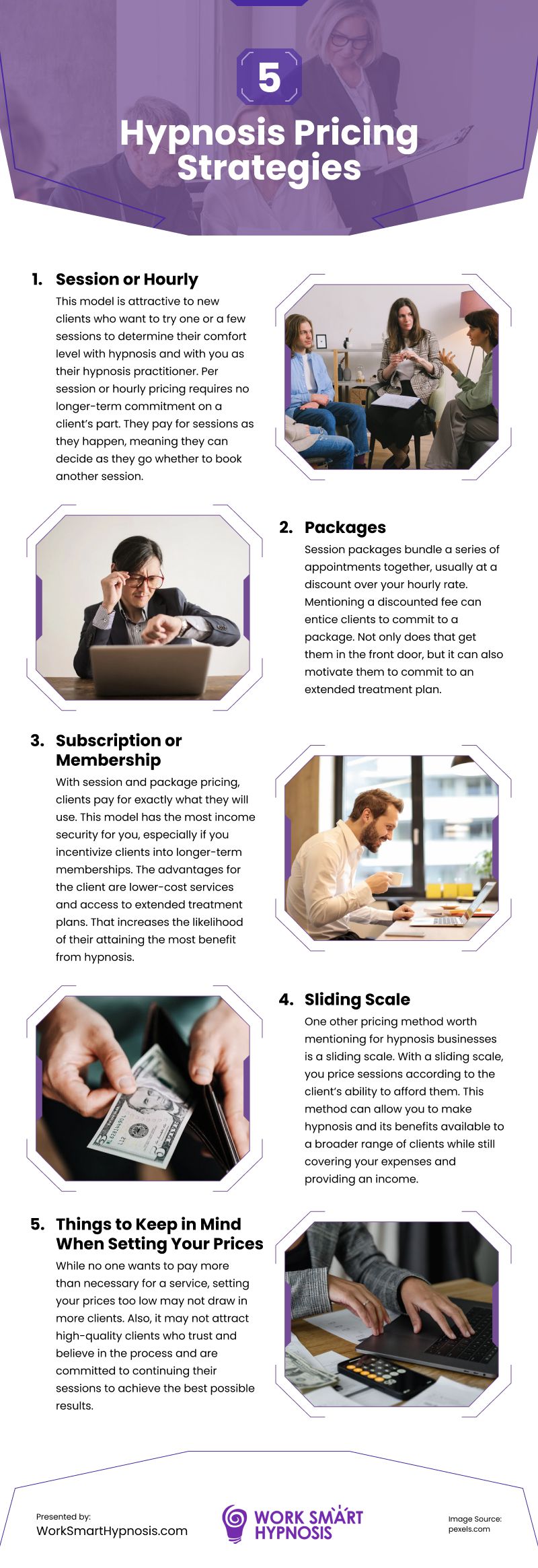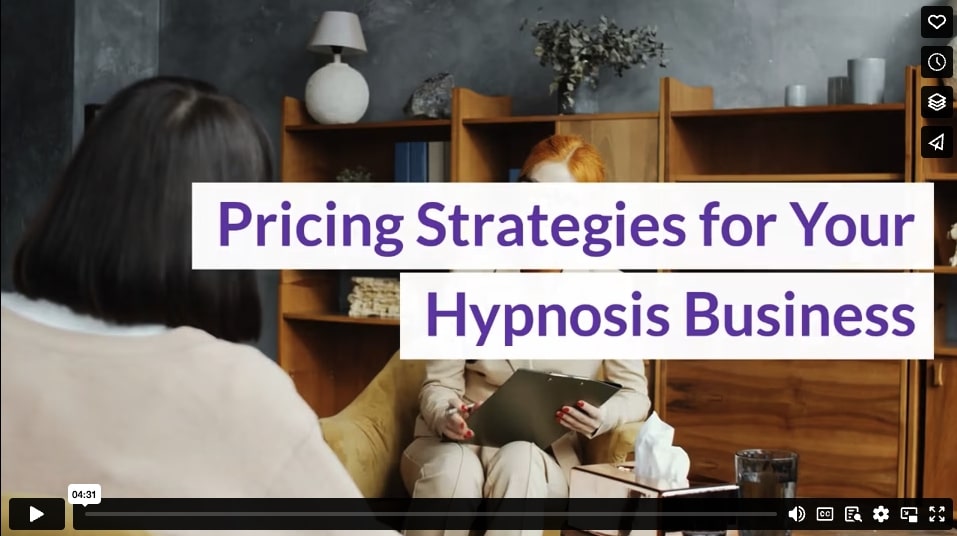On a list of “how to start a hypnosis business,” you’ve checked most of the boxes. You’ve completed your hypnosis training, found a place to practice, developed a marketing strategy, and honed your skills.
However, one central element remains before you can begin seeing clients: pricing. Your prices will determine the success of your hypnosis business in finding clients, developing long-term relationships, and creating a sustainable practice. That means you need to be thoughtful about your prices and pricing structure. Here, we will examine several different pricing strategies that you may consider.
Session or Hourly
When setting prices for their hypnosis business, most hypnotists consider the session or hourly pricing model first. With this model, you charge a set fee for each session or hour of your hypnotherapy services.
This model is attractive to new clients who want to try one or a few sessions to determine their comfort level with hypnosis and with you as their hypnosis practitioner. Per session or hourly pricing requires no longer-term commitment on a client’s part. They pay for sessions as they happen, meaning they can decide as they go whether to book another session.
That can bring in clients who may hesitate to commit money to a process or a person they aren’t familiar with. It’s a valuable strategy for you as a business owner if it encourages clients to book an appointment. However, hourly billing has disadvantages for you, mainly in the form of less predictable income. You may also see a smaller number of clients who return for more than one or two sessions.
Packages
Session packages bundle a series of appointments together, usually at a discount over your hourly rate. Mentioning a discounted fee can entice clients to commit to a package. Not only does that get them in the front door, but it can also motivate them to commit to an extended treatment plan. That can help them stick with hypnosis long enough to see outstanding, life-changing results.
You can offer simple packages, like six sessions for 10% off your hourly rate. Some hypnotists also provide more specific packages. For example, you might sell that same grouping of six sessions but call it a “smoking cessation starter bundle.” This strategy provides you with an opportunity to target specific clients, as well as a way to list many of the challenges with which hypnotherapy can help.
One advantage this model has over session or hourly pricing is that your revenue stream is slightly more predictable. You aren’t waiting each week to see if a client intends to book another session. Bundled pricing also incentivizes clients to stick with the process since they’ve already paid for their sessions.
Subscription or Membership
With session and package pricing, clients pay for exactly what they will use. With a subscription or membership model, that’s not the case. You can sell subscriptions that include a set number of sessions and discounted access to additional care. For example, a monthly membership might consist of two sessions and a 10% discount on additional appointments. If you sell merchandise, a subscription may also offer clients a purchase discount.
This model has the most income security for you, especially if you incentivize clients into longer-term memberships. The advantages for the client are lower-cost services and access to extended treatment plans. That increases the likelihood of their attaining the most benefit from hypnosis.
Sliding Scale
One other pricing method worth mentioning for hypnosis businesses is a sliding scale. With a sliding scale, you price sessions according to the client’s ability to afford them. This method can allow you to make hypnosis and its benefits available to a broader range of clients while still covering your expenses and providing an income. You set your prices based on the client’s income.
A sliding scale usually takes the place of hourly or session pricing. You have a series of rates that apply to various client income levels. However, if you prefer a hybrid model, you can set a session rate but set aside a few monthly appointments for income-based fee clients.
You can offer some or all of these three pricing strategies for your hypnosis business.
Things to Keep in Mind When Setting Your Prices
While no one wants to pay more than necessary for a service, setting your prices too low may not draw in more clients. Also, it may not attract high-quality clients who trust and believe in the process and are committed to continuing their sessions to achieve the best possible results.
With lower pricing, your client retention rates may actually decrease. You will have a revolving door of people who just want to see what hypnosis is like but have little or no intention of developing a relationship with you and your business.
If you charge significantly less than other hypnotists or wellness practitioners, you may call into question the value of your service or your skill as a hypnotist. Clients will wonder why you are so cheap and may choose to pay more to someone else. Your prices set the baseline for the perceived value of your skill.
Pricing services for your hypnosis business are more art than science. There’s no single pricing strategy that is right for every hypnotherapist. Successful hypnotists will integrate the fee models that best suit their approach to hypnosis, their target client pool, and the objective of their hypnosis business.
Video
Infographic
You’ve completed most of the steps to start a hypnosis business, but before seeing clients, you need to set your pricing. Your pricing will be crucial for attracting clients and building a sustainable practice. In this infographic, explore different pricing strategies to consider.





